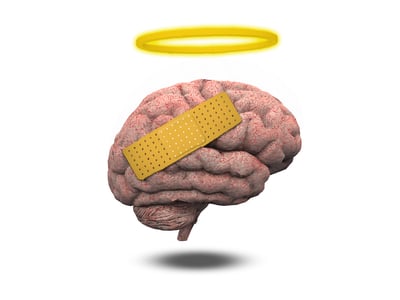Supernatural Safety
Talking about the supernatural is not in vogue these days. The membership of the church is in rapid decline, there’s no longer ‘scripture’ in schools and the history of unethical behaviour by the clergy has put religion ‘on the nose’. So there’s not much talk of miracles, wonders, god, faith and the supernatural in society today, except when it comes to fundamentalist safety. When it comes to fundamentalist safety we enter a whole new religious experience.
I was sent yet another document recently from a tier 1 company ‘preaching’ the wonders of zero harm. The slogan of the moment for this company is ‘One Way to Zero Harm’. Interestingly the language of ‘one way’ has been used in Christianity for centuries and was re-popularised in the 1970s Jesus Movement. So I downloaded the handbook to see what
One Way to Zero Harm’ was about. Based on my reading (something akin to reading the Bible) I discovered the following points of religiosity in its pages discussed as follows (religious terms highlighted in italics):
- Zero harm is aspirational: For those who know me, they know of my expertise and experience in theology, it’s why I am so familiar with CULTural things. Though discussion of this article is seated in theological knowledge it nevertheless pertains to the psychology of risk and doesn’t make the club of zero less cultic.
An aspiration is defined as a hope, dream, desire and ambition and is most often associated with what is elevated and spiritual. The root of the word “aspiration” is the latin “aspiro”, the breathe, and hence the connection to spirit/spiritual, it’s where the latin “In nomine Patris et fillii et Spiritus Sancti” (in the name of the Father, the Son and Holy Spirit) comes from. The concept of the Holy Spirit is the breath of God, or the wind of God. Hence we are also familiar with the meaning “aspirator” in medicine, to release air from an obstruction.
- Zero harm has extraordinary faith in systems: The use of the word ‘zero’ is often claimed to be essential to safety ‘culture’, yet culture is rarely defined and the policing of zero is always about systems. This kind of misdirection is common in most cults and religions. The idea that cultural formation is symbiotic with language, symbols, artefacts, appearance and a host of cultural characteristics is rarely mentioned by the proponents of zero harm.
The pathway to zero is more vigilance, more policing and inquisitions for mistakes. Any blemish on the ‘white as snow’ goal is an embarrassment in faith. The enemy of zero is a mistake and humans don’t make mistakes in this religion. In this faith, human history and sin are denied, talk of mistakes is banished to the realm of under reporting, thereby setting up an unethical tension of the real and unreal, sound familiar?
- Zero language ignores the power of scepticism, cynicism and punitive discourse. One of the big mistakes in the history of the church was its naivety to the destructive power of scepticism. All the lofty words, visions and goals are interpreted by practical people as delusional and this in itself erodes the credibility of the message and the messenger.
-
There is no grace in the message of zero, the message of intolerance is unethical and absolute.
-
The cult religion of zero has its own language, ceremonies, club, dogma, worship, confessions and articles of faith. There is a very clear demarcation between believers and non-believers.
-
The tactics of zero preaching don’t engage in debate or receive challenge, this dogma is not to be challenged but rather adopts a strategy of cultural indoctrination. There is no entertainment of doubt in zero presentations as this would erode faith.
-
Zero has so commanded the air waves of safety fundamentalist orthodoxy, so much so, that there is a belief that there is no challenge to it. For example, I have been trying to present on zero ideology for more than 2 years at conferences, including the SIA, and no one will accept a paper or presentation on the subject. My papers are accepted on anything as long as it does not challenge zero.
-
The attraction of intolerance and hypocrisy characterises this religion. Zero is always good for other people and its ideology and principles are not applied to other areas of living just safety.
-
The cult of zero de-emphasises learning. This is because risk and mistakes are essential to learning and if learning is denied then zero can be elevated as an ideal.
-
The priesthood of zero are mostly tier 1 CEOs. CEOs have a fixation on zero language without any understanding as to how language is essential to cultural formation or the fundamentals of goal setting. The denial of contradiction, dogma and disconnectedness spontaneously generates scepticism which the priesthood also deny. The priests and guardians of zero can’t imagine what their religion would be like without it, to them there is no other option, zero language is absolute. There is no sophistication in the management of cultural language or priming, for the priests of zero all language is value neutral. The belief that zero motivates and inspires is assumed by the priests, because it inspires them. However, there is no application of zero to their own behaviour.
In most religions the notion of suffering and mistakes are accepted as essential to humanness, even the Roman gods had flaws. Not so safety fundamentalism. This religion is primed for robots. Like all fundamentalist religions the zero cult has a small following, raging on their quest to heaven while the rest of us just get on with the down-to-earth issues of managing the complexities of being human at work. I reckon it takes more faith to be a believer in fundamentalist safety than the virgin birth or the Holy Trinity.




Do you have any thoughts? Please share them below